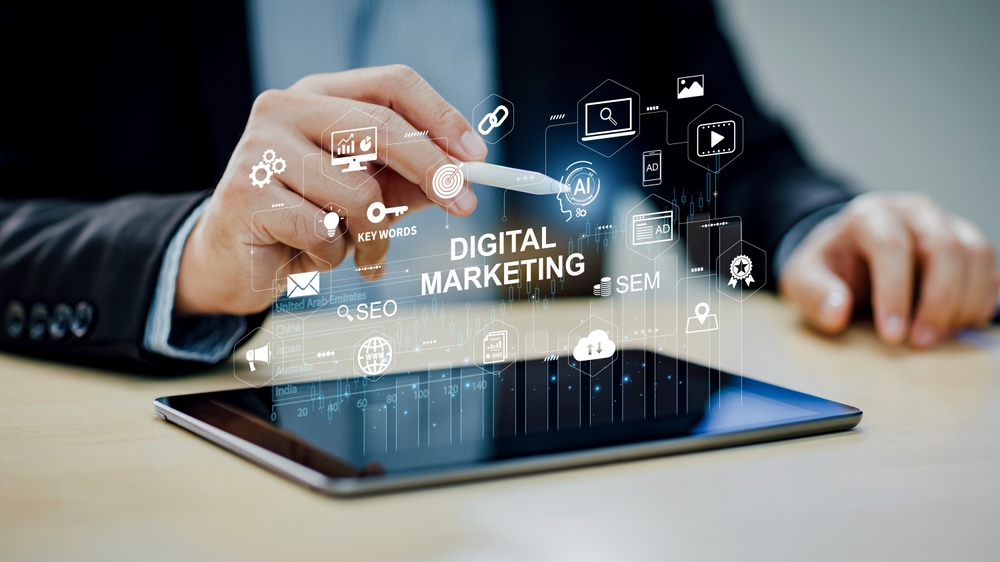AI Tools Shaping the Next Era of Digital Marketing
Table of contents

The Rise of AI in Digital Marketing
Artificial intelligence (AI) has rapidly become a critical component in the digital marketing landscape. With advancements in technology, AI tools are transforming how businesses interact with customers, optimize campaigns, and enhance their marketing strategies. These AI-driven platforms are bringing about a new era where data-driven decisions, personalized content, and efficient customer engagement are at the forefront.
AI tools are increasingly being used to automate routine tasks and processes, which saves time and reduces human error. For instance, chatbots, powered by AI, can handle customer inquiries in real-time, providing instant support and freeing up human resources for more complex tasks. Furthermore, AI is enhancing data analysis capabilities, allowing marketers to gain deeper insights into consumer behavior and preferences, which is crucial for developing effective marketing strategies.
AI in digital marketing also significantly impacts content creation. Tools powered by AI algorithms can generate blog posts, social media updates, and email copy that resonate with the targeted audience. By analyzing user data, these tools help in crafting messages that are both engaging and relevant, thus improving conversion rates.
AI-Powered Personalization in Digital Marketing
Personalization is a major trend in digital marketing, and AI tools are at the center of this evolution. AI enables marketers to deliver personalized experiences based on consumer data such as browsing history, purchase behavior, and demographic information. This level of personalization helps in building stronger relationships with customers, increasing brand loyalty and driving sales.
AI tools like recommendation engines analyze user data to suggest products or services that align with individual preferences. This not only enhances the customer experience but also boosts the likelihood of a purchase. Moreover, AI-driven personalization extends across various platforms, ensuring consistent messaging whether a customer interacts through a website, mobile app, or email.
Additionally, AI tools help in segmenting audiences more effectively. By identifying patterns and trends within consumer data, marketers can create more tailored marketing campaigns that speak to the needs and interests of specific audience segments. This targeted approach increases the efficiency and effectiveness of marketing efforts.
AI Tools Revolutionizing Advertising Strategies
Advertising is another area where AI tools are making a substantial impact. AI-driven platforms are optimizing ad placements, targeting, and budgeting, ensuring that marketing dollars are spent wisely. By leveraging machine learning algorithms, these tools can predict the success of ad campaigns and make necessary adjustments in real-time.
One of the key advantages of using AI in advertising is the capability to analyze vast amounts of data quickly and accurately. This enables marketers to identify the best platforms and times for ad placements, maximizing reach and engagement. Furthermore, AI tools assist in creating more compelling ad content by understanding what resonates with the target audience.
AI tools are also instrumental in A/B testing, allowing marketers to test different versions of ads to determine which performs better. This data-driven approach to advertising ensures that campaigns are continually optimized to achieve the best possible results.
AI and the Future of SEO
Search engine optimization (SEO) is evolving with the integration of AI tools. AI is transforming how businesses approach SEO by providing more sophisticated insights into search trends and user intent. These tools use machine learning to analyze search engine algorithms, helping marketers stay ahead of changes and adapt their strategies accordingly.
AI tools enhance keyword research by identifying high-value keywords that competitors might overlook. They also assist in content optimization by recommending topics and phrases that align with trending search queries. This ensures that content is both relevant and authoritative, improving search engine rankings.
Moreover, AI-powered analytics provide deeper insights into website performance and user behavior, allowing marketers to refine their SEO strategies. By understanding how users interact with a website, businesses can make informed decisions to enhance user experience and increase organic traffic.
The Pros and Cons of AI in Digital Marketing
The integration of AI in digital marketing offers numerous benefits but also comes with challenges. One significant advantage is the ability to process and analyze large volumes of data quickly and accurately, leading to more informed decision-making. AI tools can automate repetitive tasks, freeing up marketers to focus on strategy and creative development.
However, there are potential downsides, such as the risk of over-reliance on automated systems, which might lead to a loss of the human touch in marketing. Additionally, privacy concerns arise with the use of AI in handling consumer data, making it essential for businesses to ensure compliance with data protection regulations.
As AI continues to evolve, marketers must balance the use of technology with the need for genuine human interaction. This balance will determine the future success of AI-driven marketing strategies.
Emerging Trends in AI-Driven Digital Marketing
The future of digital marketing is increasingly intertwined with AI technology as new trends continue to emerge. One such trend is the rise of voice search optimization. With more consumers using voice-activated devices, marketers must adapt their strategies to capture this growing segment.
Another emerging trend is the use of AI for predictive analytics. By analyzing historical data, AI can predict future trends, enabling marketers to proactively address consumer needs and stay ahead of the competition.
AI is also driving innovations in visual search technology, allowing users to search for products using images rather than text. This opens up new possibilities for engaging consumers and enhancing the shopping experience.
Conclusion
In conclusion, AI tools are shaping the next era of digital marketing by offering unprecedented levels of automation, personalization, and insight. As businesses continue to embrace AI technology, they can expect to see improved efficiency, increased customer engagement, and higher conversion rates. However, it is crucial to balance technological advancements with the human element of marketing to maintain authenticity and trust.
FAQs about AI Tools in Digital Marketing
What are AI tools in digital marketing?
AI tools in digital marketing refer to software applications that use artificial intelligence algorithms to automate and optimize marketing tasks, analyze consumer data, and enhance customer engagement.
How do AI tools improve marketing strategies?
AI tools improve marketing strategies by providing data-driven insights, enabling personalized content delivery, optimizing ad placements, and automating repetitive tasks, thus increasing efficiency and effectiveness.
Are AI tools replacing human marketers?
AI tools are not replacing human marketers but rather augmenting their capabilities by handling routine tasks and providing insights that require human creativity and strategic thinking for implementation.
What is the future of AI in digital marketing?
The future of AI in digital marketing involves continued advancements in automation, personalization, and predictive analytics, leading to more effective marketing strategies and improved customer experiences.
How does AI enhance personalization in marketing?
AI enhances personalization in marketing by analyzing consumer data to deliver tailored experiences, product recommendations, and targeted messaging that aligns with individual preferences and behaviors.








